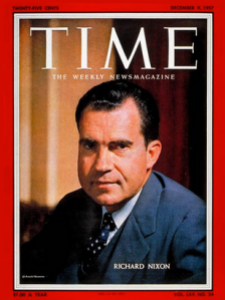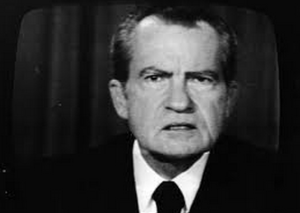It’s easy to talk about the devilish elements of Richard Milhous Nixon’s personality, but what about the unexplored teddy bear side of him? The side that could play a part in community theater and fall in love with Pat Ryan (whom Nixon met during said community theater stint). Sure, he hated Jews and most other minorities and, yes, there was a time when he worked as a litigation lawyer defending petroleum companies. But let’s not forget about his passion for politics and that time he gave up going to Harvard to stay in Whittier because he was not a well man (which surely shows some sort of endearing weakness and evokes sympathy for the dream he didn’t get to live out).
Let us also take note of the fact that even though Nixon was born a Quaker and could have exempted himself from entering the Navy post-Pearl Harbor, he chose to enlist anyway, revealing a certain zeal and nobility that most people don’t associate him with. And then, of course, there was his Checkers speech, an earnest–almost maudlin–imploring for the American people not to believe the rumors that he had a political fund that allowed him reimbursement from his political backers. He admitted, in an uncharacteristically “cutesy” fashion, that the only thing he received as political motivation was a cocker spaniel from Texas named Checkers.

Another indication of the more moralistic side of Nixon’s character was his behavior in the wake of a heart attack President Eisenhower suffered in 1955. At the time, there had never been a precedent set for how a vice president should act in such a situation, and the 25th amendment–which states, ” In case of the removal of the President from office or of his death or resignation, the Vice President shall become President.”–had not yet been implemented into the Constitution. Nonetheless, Nixon willingly took over President Eisenhower’s duties without seeking to position himself as a better choice for president or allowing other members of the Cabinet to seek power for themselves.
Maybe, like so many men, unbridled power was what brought out the worst in Nixon as it wasn’t until he became the thirty-seventh president of the U.S. that his darker side began to shine through more strongly. Prior to the late 60s, Nixon seemed to have no shortage of benevolent acts, even helping with the passage of the Civil Rights Act of 1957 (ironic, yes) and traveling to other countries to help better hone his knowledge of foreign policy (see: The Kitchen Debate).
http://youtu.be/-CvQOuNecy4
Nixon presented one of the ultimate conundrums in human character. He was a man who struggled with insecurity and let it get the better of him in the end. That so many people judge him as wholly evil is objectively unfair. For no one is entirely good or evil (especially if they’re Californian). We each embody different aspects of these constructs at varying moments in our lives.




















